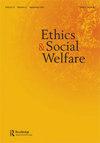Democratizing the Past for the Equal Present and Future Wellbeing of all Members of a Polity
IF 0.9
Q4 SOCIAL WORK
引用次数: 0
Abstract
ABSTRACT The political institutionalisation of common wellbeing and the promise that all members of the polity count equally gives political rule its legitimisation. Access to resources at the disposal of public authorities and the ethico-political standing to call upon them is not distributed equally across all groups in a polity. The political struggles of the Wet’suwet’en against the pipeline occupation of Indigenous land, and the initiatives of Black Americans/Turtle Islanders for ReADdress for Slavery attest to this. 1 These struggles demonstrate that there are forms of past harmdoing that have an effect on, and are inscribed in, present structures and arrangements of the political. This article looks at the past and present epistemic ignorances and power inequalities to co-shape the authoritative political version of wellbeing that lead to ethico-political abandonment and a refusal to renegotiate the structures and institutions in North America/Turtle Island now that Wet’suwet’en and Black Americans (ought to) have an equal ethico-political standing. I demonstrate that the past injustices of colonialism and slavery co-shape the polity’s present and its haveable futures. Acts of democratising the past in the present bestow upon the harmed an inclusion in current political attentiveness and wellbeing that they did not experience from past contemporaries.民主化过去,使所有政体成员享有平等的现在和未来的福祉
共同福祉的政治制度化和所有政体成员平等计算的承诺赋予了政治统治合法性。在一个政体中,获得公共当局所支配的资源的机会和需要这些资源的种族-政治地位并不是平等地分配给所有群体的。Wet 'suwet 'en反对管道占领土著土地的政治斗争,以及美国黑人/龟岛人争取解决奴隶制的倡议都证明了这一点。这些斗争表明,过去的一些形式的伤害对当前的政治结构和安排产生了影响,并铭刻在其中。这篇文章着眼于过去和现在的认知无知和权力不平等,共同塑造了权威的幸福政治版本,导致了种族政治的放弃,并拒绝重新谈判北美/海龟岛的结构和制度,因为白人和黑人美国人(应该)拥有平等的种族政治地位。我证明了过去的不公正的殖民主义和奴隶制共同塑造了政体的现在和未来。将过去民主化的行动赋予了受伤害的人在当前的政治关注和福祉中,这是他们从过去的同时代人那里没有经历过的。
本文章由计算机程序翻译,如有差异,请以英文原文为准。
求助全文
约1分钟内获得全文
求助全文
来源期刊

Ethics and Social Welfare
SOCIAL WORK-
CiteScore
1.60
自引率
20.00%
发文量
36
期刊介绍:
Ethics and Social Welfare publishes articles of a critical and reflective nature concerned with the ethical issues surrounding social welfare practice and policy. It has a particular focus on social work (including practice with individuals, families and small groups), social care, youth and community work and related professions. The aim of the journal is to encourage dialogue and debate across social, intercultural and international boundaries on the serious ethical issues relating to professional interventions into social life. Through this we hope to contribute towards deepening understandings and further ethical practice in the field of social welfare. The journal welcomes material in a variety of formats, including high quality peer-reviewed academic papers, reflections, debates and commentaries on policy and practice, book reviews and review articles. We actively encourage a diverse range of contributions from academic and field practitioners, voluntary workers, service users, carers and people bringing the perspectives of oppressed groups. Contributions might include reports on research studies on the influence of values and ethics in social welfare practice, education and organisational structures, theoretical papers discussing the evolution of social welfare values and ethics, linked to contemporary philosophical, social and ethical thought, accounts of ethical issues, problems and dilemmas in practice, and reflections on the ethics and values of policy and organisational development. The journal aims for the highest standards in its published material. All material submitted to the journal is subject to a process of assessment and evaluation through the Editors and through peer review.
 求助内容:
求助内容: 应助结果提醒方式:
应助结果提醒方式:


